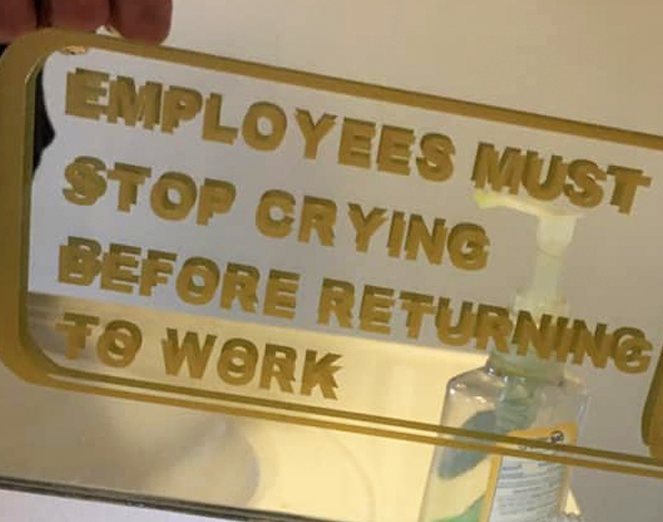

The RNC hadn’t happened yet.


The RNC hadn’t happened yet.


I appreciate the notion, but I fear it would probably just result in management saying “just NERD HARDER”. The flip side of being more careful and focused is being less flexible. Not gonna replace that ancient foundational framework that was deprecated in 2015 if it risks legal liability.


Having been in this position, I’m sure having two apps is hell for them and increasingly complicated the more the features and back-end services overlap. And there would probably have been drastically more overlap between v2 and v3 than v1 and v2.
Ultimately, you just wanna be on one codebase.
I’m not saying this is a good or okay move by Sonos as a company to their consumers. But the die was cast when the product roadmap was established, and the short-sighted technical solutions people are throwing out in the comments are far worse options for the company (and consumers, in the long run) than just accepting the current problem and moving on.



(Photo of IoT dev living in your proposed world, colorized 2024)


It’s not that simple. They sold new hardware that claimed app support, and the app support was only in the new codebase.


This is what happens when a digital rewrite is on the critical path of a physical product.
Physical product development is a behemoth. Manufacturing, certification, marketing, shipping, warehousing, contracts with retailers, etc. all add up to mean that, past a certain point in the project, the product is gonna launch whether the digital side is ready or not.
If the C-level/VP-level folks aren’t willing to tailor the product roadmap to allow for a safe rewrite effort, you’re pretty much guaranteed this outcome.
(Options are either keep the new product on the back burner until after the rewrite settles, or launch the product without IoT support at first. But you gotta plan for these up-front so you don’t mess up your product’s legal claims.)


Yeah, for sure that’s the primary allusion. But the fact that there’s a secondary meaning which is explicitly religious and moral is… more than a little awkward.
Does this imply the existence of Willem DaFriend?


Nimbus
Wow, really? Making saintly allusions towards any government is fraught, but especially this one.


Two economists are walking in a forest when they come across a pile of shit.
The first economist says to the other “I’ll pay you $100 to eat that pile of shit.” The second economist takes the $100 and eats the pile of shit.
They continue walking until they come across a second pile of shit. The second economist turns to the first and says “I’ll pay you $100 to eat that pile of shit.” The first economist takes the $100 and eats a pile of shit.
Walking a little more, the first economist looks at the second and says, “You know, I gave you $100 to eat shit, then you gave me back the same $100 to eat shit. I can’t help but feel like we both just ate shit for nothing.”
“That’s not true”, responded the second economist. “We increased the GDP by $200!”


I was curious about the adoption thing and didn’t wanna just weigh in on vibes, so I took 5 seconds to search it and yall…
Some of this is bleak.
https://time.com/6051811/private-adoption-america/
Anne Moody, author of the 2018 book The Children Money Can Buy, about foster care and adoption, says the system can amount to “basically producing babies for money.”
Claudia Corrigan D’Arcy, a birth-parent advocate and birth mother who blogs extensively about adoption, says she routinely hears of women facing expense-repayment pressures. Some states, such as California and Nevada, explicitly consider birth-parent expenses an “act of charity” that birth parents don’t have to pay back. In other states, though, nothing prohibits adoption entities from trying to obligate birth parents to repay expenses when a match fails.


Which bullet point merits a comparison to genocide?


If we ignore the brainworm parts, there are some good points here:


judge rules
Doesn’t sound like it.


There’s already a state-level effort on #2 that’s pretty far along: https://en.wikipedia.org/wiki/National_Popular_Vote_Interstate_Compact


Tech companies are committed to turning satire into reality.


Jesse Ventura


The reason I’m skeptical of a copyright-based solution is that there’s a massive potential for collateral damage.
Like, the overall process of creating ChatGPT is not that different from the process of using ML to analyze how language use has changed over time, which I think is a completely positive thing for humanity and probably doesn’t ruffle anyone’s feathers.
I’m not sure how you write legislation that zeroes in on the exact harms posed by ChatGPT et. al. but doesn’t endanger these other efforts… and also doesn’t leave open an alternative, indirect route for OpenAI, Stability, et. al. to accomplish the same end goal without technically infringing.
There’s also the “giving a bullied kid more lunch money” criticism that Cory Doctorow is fond of using:
After 40 years of expanded copyright, we have a creative industry that’s larger and more profitable than ever, and yet the share of income going to creative workers has been in steady decline over that entire period. Every year, the share of creative income that creative workers can lay claim to declines, both proportionally and in real terms.
As with the mystery of Spotify’s payments, this isn’t a mystery at all. You just need to understand that when creators are stuck bargaining with a tiny, powerful cartel of movie, TV, music, publishing, streaming, games or app companies, it doesn’t matter how much copyright they have to bargain with. Giving a creative worker more copyright is like giving a bullied schoolkid more lunch-money. There’s no amount of money that will satisfy the bullies and leave enough left over for the kid to buy lunch. They just take everything.
Telling creative workers that they can solve their declining wages with more copyright is a denial that creative workers are workers at all. It treats us as entrepreneurial small businesses, LLCs with MFAs negotiating B2B with other companies. That’s how we lose.
Source: https://pluralistic.net/2024/06/21/off-the-menu/
You might be interested to see how FTC Chair Lina Khan thinks about this stuff, from a position which has a great deal of labor and antitrust regulatory power but no say in copyright: https://www.youtube.com/watch?v=3mh8Z5pcJpg


Edit:
I recommend Robert Evans’ analysis of the manifesto and the rest of the AI hype: https://www.rollingstone.com/culture/culture-features/ai-companies-advocates-cult-1234954528/
“We believe any deceleration of AI will cost lives,” his manifesto states. “Deaths that were preventable by the AI that was prevented from existing is a form of murder.”
And murder is a sin. The more you dig into Andreessen’s theology, the more it starts to seem like a form of technocapitalist Christianity. AI is the savior, and in the case of devices like the Rabbit, it might literally become our own, personal Jesus. And who, you might ask, is God?
“We believe the market economy is a discovery machine, a form of intelligence — an exploratory, evolutionary, adaptive system,” Andreessen writes.
[…Evans makes a comparison to Scientology, and their belief that those who stand in the way of their “tech” become “fair game”…]
My point is that the goals Andreessen and the e/acc crew champion right now are based in faith, not fact. The kind of faith that makes a man a murderer for doubting it.
Andreessen’s manifesto claims, “Our enemies are not bad people — but rather bad ideas.” I wonder where that leaves me, in his eyes. Or Dr. Roli for that matter. We have seen many times in history what happens when members of a faith decide someone of another belief system is their enemy. We have already seen artists and copyright holders treated as “fair game” by the legal arm of the AI industry.
Who will be the next heretic?
Headline makes it sound like the senators previously urged the FTC but were ignored.
Two things:
1: The “urging” mentioned took place today.
2: